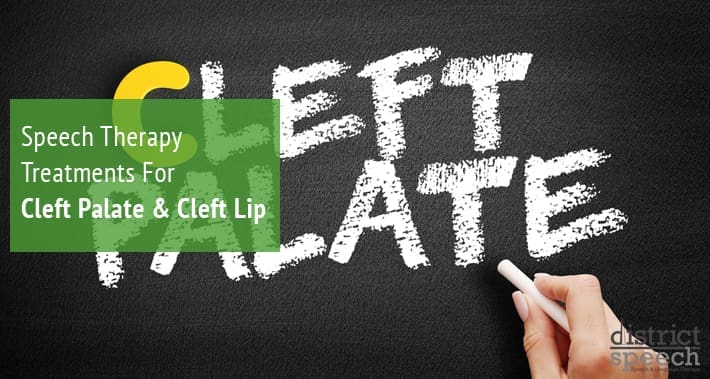
A cleft palate and a cleft lip are congenital issues that can manifest while your baby is developing in the womb.
There are a number of different symptoms and causes of a cleft palate and a cleft lip that we’re going to dive into below.
Fortunately, there are a number of speech therapy treatments for cleft palate and cleft lip that can help.
But it’s worth noting that if you notice your child has difficulty speaking due to their cleft palate or cleft lip, speech therapy early intervention is key.
This is because the younger your child begins their speech therapy, the greater the chances of success.
Older children have had more time to cement bad speech habits, which makes breaking them more challenging, but of course not impossible.
Now, let’s dive into some more information about cleft palate, cleft lip, and how speech language therapy can help.
What Is Cleft Palate And Cleft Lip?
Cleft lip and cleft palate are two separate conditions, although they can occur together in your child.
They both occur during the development of your child in the womb.
When your child develops their lips and palate, each side has to fuse together in the middle.
When each side of their lips or palate fail to fuse together during development, it causes cleft lip or cleft palate.
Let’s take a closer look at each.
If your child has a cleft palate, it’s because the roof of their mouth failed to fuse properly during early development.
Your palate is made up of two parts: the hard palate and the soft palate.
The hard palate is the bony portion at the front of the roof of your mouth.
The soft palate is found at the back of your mouth and consists of soft tissue.
You can tell the difference between these two parts by running your tongue along the roof of your mouth, front to back.
As you get close to as far back as you can reach, you’ll notice it gets significantly softer.
Now, either of these parts can be cleft.
On the other hand, a cleft lip occurs when there is a split in the lip.
It can be a small split, but it also can be large enough to connect the upper lip and nose.
When it’s a small split, it is usually referred to as an incomplete cleft lip.
A large split, up to the nose, is referred to as a complete cleft lip.
There are also different types of cleft lip.
If your child has a cleft lip, it can be unilateral or bilateral.
A unilateral cleft lip only occurs on one side of their lip.
It usually occurs in line with your child’s nose.
If your child has a bilateral cleft lip, they have two clefts in their lip on either side of their mouth.
Symptoms Of Cleft Palate And Cleft Lip
To start, a split in the lip is the most visible sign of a cleft lip.
If your child has a cleft palate, the first noticeable symptom may occur during breast or bottle feeding.
If milk comes out of your baby’s nose while they are feeding, it is a sign of cleft palate.
This is caused by an abnormal barrier between the mouth and the nose due to their cleft palate.
Another is that as your child grows, it is possible for your child to have dental problems like missing or extra teeth.
A cleft palate can also trigger frequent middle ear infections, which can lead to hearing loss without prompt treatment.
Finally, a cleft palate may also lead to problems with speech, which is often characterized by a nasal quality in the voice.
What Causes Cleft Palate And Cleft Lip
The direct cause of a cleft palate and cleft lip is not yet known.
However, there are some factors that doctors believe contribute to an increased risk of developing a cleft palate and cleft lip during pregnancy.
These include:
- Drinking alcohol
- Cigarette smoking
- Being diabetic
- Not getting enough prenatal vitamins like folic acid
Other than these, it is most likely caused by genetics.
A cleft palate and cleft lip can occur isolated at birth or as part of a larger genetic syndrome like Van der Woude syndrome, which is a genetic issue.

Medical Intervention For Cleft Lip And Cleft Palate
Often, cleft palate or cleft lip can be diagnosed while your child is still in the wound using an ultrasound.
An ultrasound uses high frequency sound waves to create an image of the baby in your abdomen, where your doctor can then check for this.
The medical intervention for a child with a cleft palate or cleft lip will depend on the severity of the condition.
Often, this will involve surgeries to reconstruct your baby’s face after closing the opening.
This is typically achieved with a team of specialists including a plastic surgeon, an oral surgeon, and an orthodontist.
How Can A Speech Therapist Help With Cleft Lip And Cleft Palate?
If your child has problems with speech because of their cleft, a speech therapist is a great resource to help them overcome their obstacles and enjoy as much ease in their speech as any other child.
Specially, a speech therapist can help by evaluating your child’s:
- Resonance and airflow or air pressure
- Articulation
- Oral mechanism
- Speech and language
By training and improving these four areas, a speech therapist can improve your child’s capacity for speech immensely.
It’s a good idea to begin speech therapy younger to help reduce your child’s speech difficulties and improve the outcome of speech therapy.
But, it is in the area of articulation that a speech therapist truly shines.
Your child’s speech therapist is able to identify if your child is making compensatory errors with their articulation.
A compensatory error is if your child is not able to form the pressure needed to make pressure consonants like the letters ‘B’, ‘D’, ‘P’, or ‘T’.
Training to improve this with a speech therapist is of great benefit in these cases.
A potential treatment plan may include:
- Proper articulation training
- Considering voice, manner and placement
- Establishing new speech techniques to replace erroneous ones
- Establishing oral pressure techniques
Book Your Appointment With District Speech Today
If your child struggles with speech due to a cleft palate or cleft lip, consider booking an appointment with District Speech as soon as possible.
The sooner your child begins their speech therapy, the greater the chances of success.
This is because older children have had more time to ingrain bad habits, which makes breaking them more challenging.
Book your appointment with us at District Speech today if you’re looking for speech therapy treatments for cleft palate and cleft lip to schedule an evaluation for your child.
We provide virtual teletherapy speech therapy appointments as well as in person for your convenience.
Book your appointment with District Speech today.
1300 I St NW, Suite 400 E,
Washington, DC 20005
- https://g.page/districtspeech
District Speech and Language Therapy specializes in speech therapy, physical therapy, and occupational therapy solutions, for both children and adults, in the Washington D.C and the Arlington Virginia areas.